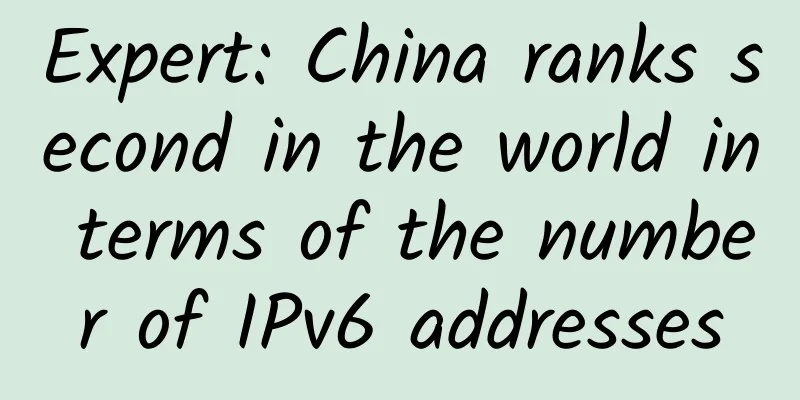Expert: China ranks second in the world in terms of the number of IPv6 addresses

|
The global Internet Protocol (IP) address allocation is transitioning to the next generation Internet based on IPv6. Experts from the Asia-Pacific Internet Network Information Center said at the 2018 Global Next Generation Internet Summit that the United States currently ranks first in the world in terms of both IPv6 and IPv4 addresses, while China ranks second in the world in terms of both types of addresses. IPv6 is the abbreviation of "Internet Protocol Version 6". It is the next-generation Internet core protocol designed by the Internet Engineering Task Force to replace the current "Internet Protocol Version 4" (IPv4). As one of the world's five major regional Internet registries, the Asia-Pacific Network Information Center is responsible for the allocation and management of IP addresses and related resources in the Asia-Pacific region. Pan Guangliang, the director of registration services of the center, said in a report on the 22nd that the IPv4 version of the Internet Protocol addresses has been allocated out in general. As of December 2017, there was less than one Class A IPv4 address left in the world's five major regions, and the African Network Information Center, which has the largest number of remaining addresses, had only 0.76 remaining. IPv6 address allocation has thus entered the "fast lane". According to statistics from the world's five major regional Internet registries, as of December 2017, more than 90% of member units in Latin America and the Caribbean have both IPv6 and IPv4 addresses, the highest proportion in the world; and in Africa, where this proportion is the lowest, about 43% of member units have both IPv6 and IPv4 addresses. "For the total number of IPv6 protocol addresses, the ones that have been allocated are just a drop in the ocean, so we don't need to worry about running out of IPv6 addresses, but how to use them well," said Pan Guangliang. Currently, the top five countries with the most IPv6 addresses are the United States, China, the United Kingdom, Germany and France. Pan Guangliang predicts that more IP addresses will be allocated to China in the next few years, and "in the future, the number of IPv6 addresses owned by China may exceed that of the United States." |
<<: How will the two major operators' competition to upgrade IPv6 affect me?
>>: Stop shouting slogans, how to implement IPv6? Operators give details
Recommend
The first in the industry! China Network Security and China Merchants Group signed a comprehensive network information security service contract
In order to actively respond to the national stra...
Saving 5G, starting with removing the pull-down 5G switch?
Recently, many users have found that the 5G signa...
5G is not about mobile phones, but about the Internet of Things.
[[320662]] Recently, new infrastructure has conti...
Will 5G slicing turn operators into "patchers"? Here's how operator experts interpret it
Topic fuse: What is network slicing? This new con...
Is 5G connectivity the future of IoT?
The three major US mobile operators AT&T, T-M...
5G is useless: Why do some people still say that 5G is useless?
The Ministry of Industry and Information Technolo...
Afen teaches you to avoid the pitfalls of installing RabbitMQ (command practice)
This article is reprinted from the WeChat public ...
Today's encryption mechanisms will be defeated by quantum attacks, except for generalized knapsack codes.
[51CTO.com original article] Today's encrypti...
How does a router choose a more appropriate path among many routing protocols, manual configurations, and routing policies?
Routers are important network devices that realiz...
McKinsey: 5G development is not fast, and 5G upgrades will reach a climax in 2022
The 5G era is coming. How does the industry view ...
Pride and Prejudice in Data Centers About Software
When it comes to data centers, most people will f...
Promote high-quality development of 5G digital "new infrastructure" through development model innovation
The CPC Central Committee and the State Council a...
The difference between edge computing and distributed computing
Edge computing focuses on placing computing and s...
The benefits of modern networks for businesses
Enterprise adoption of software-defined and virtu...









